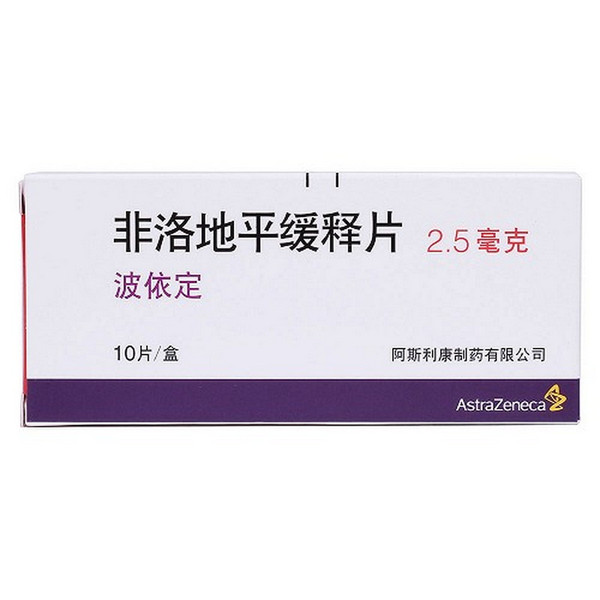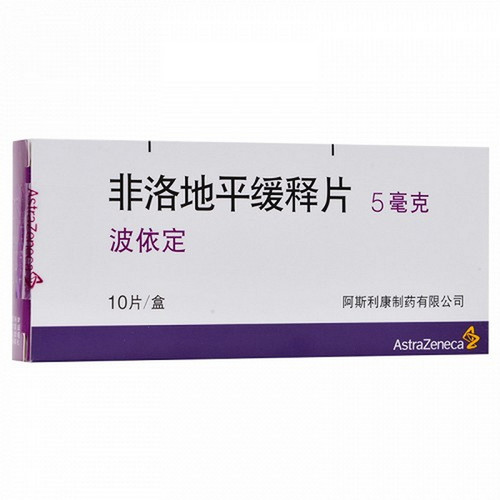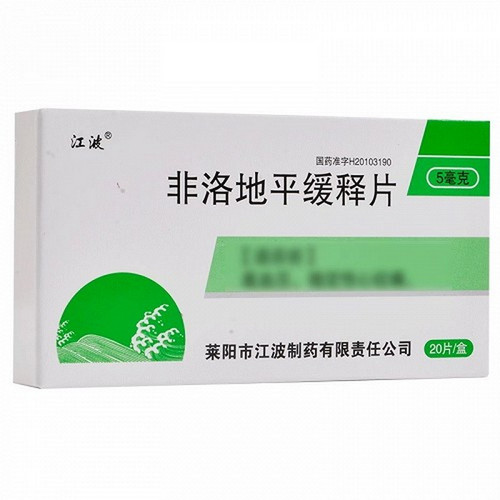Product Overview
[Drug Name]
Generic Name: Felodipine Sustained-Release Tablets
Trade Name: Plendin
English Name: Felodipine Sustained-Release Tablets
Chinese Pinyin: Feiluodiping Huanshi Pian
[Ingredients]
The active ingredient is felodipine.
[Properties]
This product is a film-coated tablet; the film coating appears white upon removal.
[Indications]
Hypertension, stable angina pectoris.
[Dosage and Administration]
Oral administration; dosage should be individualized. The tablet should be taken in the morning with water. Do not break, crush, or chew the tablet.
1. Treatment of Hypertension: The recommended starting dose is 5 mg once daily. The usual maintenance dose is 5 or 10 mg once daily. The dose may be reduced or increased based on patient response, or other antihypertensive medications may be added. Dose adjustments should generally be made at least every two weeks.
2. Treatment of Angina Pectoris: The recommended starting dose is 5 mg once daily. The usual maintenance dose is 5 or 10 mg once daily.
[Adverse Reactions]
Common adverse reactions after taking this drug include peripheral edema (usually occurring 2-3 weeks after use, with incidence related to age and dosage), headache, and facial flushing. Peripheral edema is usually mild and is related to age and dosage. Other adverse reactions include fatigue, fever, palpitations, nausea, indigestion, constipation, dizziness, paresthesia, upper respiratory tract infection, cough, runny nose, sneezing, rash, and gingival hyperplasia.
[Contraindications]
Felodipine is contraindicated in patients with allergies, severe hypotension, or aortic stenosis.
[Precautions]
1. This drug can cause severe hypotension and syncope, reflex tachycardia, and angina in susceptible individuals. Use with caution in patients with hypotension. 2. This drug should be used with caution in patients with heart failure and impaired heart function. Be aware of its negative inotropic effects, especially when used in combination with beta-blockers. 3. This drug should be used with caution in pregnant women, lactating women, and children. Elderly patients (over 65 years old) or those with hepatic impairment should begin treatment with a low dose (2.5 mg once daily) and closely monitor blood pressure during dose adjustment. 4. Clinical trials have shown that doses exceeding 10 mg daily can increase the antihypertensive effect, but also increase the incidence of peripheral edema and other vasodilatory adverse events. Patients with renal insufficiency generally do not require dose adjustment. 5. This product should be taken orally on an empty stomach or with a small, bland meal. The tablet should be swallowed whole and not crushed or chewed. Maintaining good oral hygiene can reduce the incidence and severity of gingival hyperplasia.
[Special Use in Special Populations]
Precautions for Children:
Experience with this product in children is limited.
Precautions for Pregnancy and Lactation:
1. Pregnancy. There are currently no data on the use of felodipine in pregnant women. Due to teratogenicity observed in animal studies, felodipine should not be used by pregnant women. Pregnancy must be excluded when recommending the use of felodipine. Calcium antagonists can inhibit uterine pseudocontractions, but there is no definitive evidence that felodipine can delay delivery in full-term pregnancies. Due to peripheral vasodilation and resulting blood flow redistribution, there is a risk of hypotension, maternal and fetal chloride depletion, and uterine hypoperfusion. 2. During lactation. Felodipine is excreted in breast milk. If a mother takes therapeutic doses of felodipine, only a minimal amount is transferred to the child through breast milk. There is insufficient experience with felodipine treatment in lactating women to assess the risk to the infant. Therefore, felodipine is contraindicated during lactation. If the medical benefits of continued felodipine treatment are deemed to outweigh the risks, consideration should be given to discontinuing breastfeeding.
[Precautions for Elderly Patients]
The blood concentration of this drug increases with age. Therefore, the recommended initial dose for elderly patients (over 65 years of age) is 2.5 mg per day, with dose adjustments based on individual response.
[Drug Interactions]
1. Concomitant use of certain drugs that interfere with the cytochrome P450 3A4 enzyme system may affect the blood concentration of dihydropyridine calcium antagonists, such as felodipine. Hepatic enzyme inhibitors (such as cimetidine, erythromycin, itraconazole, ketoconazole, and certain flavonoid compounds found in grapefruit juice) may increase felodipine plasma concentrations. Hepatic enzyme inducers (such as phenytoin, carbamazepine, rifampicin, and barbiturates) may decrease felodipine plasma concentrations. 2. Felodipine does not affect cyclosporine plasma concentrations. 3. Although felodipine has a high degree of plasma protein binding, it does not affect the binding of other highly plasma protein-bound drugs (such as warfarin). 4. Coadministration of this product with digoxin has not been shown to significantly alter the pharmacokinetic behavior of digoxin in patients with heart failure. 5. Other drugs, such as indomethacin or spironolactone, do not interact significantly with this product. [Pharmacological Action] This product is a dihydropyridine calcium channel antagonist (calcium channel blocker). It reversibly competes with nitrendipine and/or other calcium channel blockers for dihydropyridine binding sites, blocking voltage-dependent Ca2+ currents in vascular smooth muscle and cultured rabbit atrial cells, and K+-induced portal vein contracture in rats. In vitro studies have shown that this product has a more selective inhibitory effect on vascular smooth muscle than on myocardium; negative inotropic effects have been detected in vitro, but not in whole animals.
[Storage] Store below 25°C.
[Specification] 2.5 mg x 10 tablets
[Packaging Specification] Box
[Expiry Date] 36 months.
[Approval Number] National Medicine Standard H20030414
[Manufacturer] Company Name: AstraZeneca Pharmaceuticals Co., Ltd.








